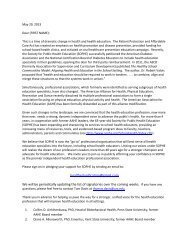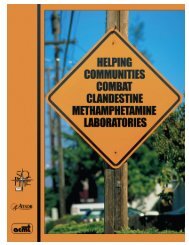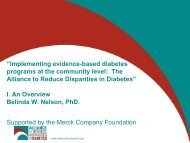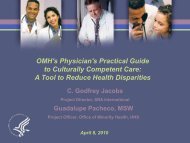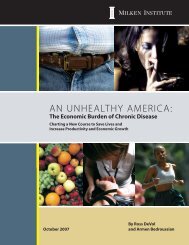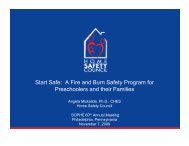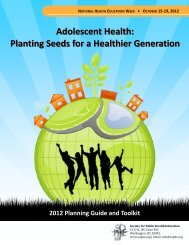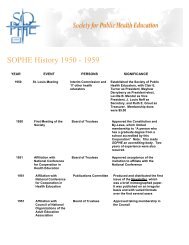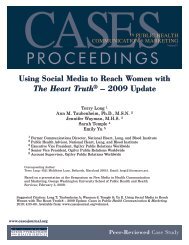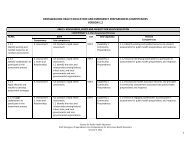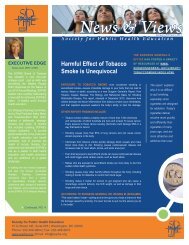healthy people 2020 - Society for Public Health Education
healthy people 2020 - Society for Public Health Education
healthy people 2020 - Society for Public Health Education
Create successful ePaper yourself
Turn your PDF publications into a flip-book with our unique Google optimized e-Paper software.
✯ Conference Abstracts ✯<br />
saturday | november 6<br />
in stores and schools, unsafe street crossings and sidewalks, and the need<br />
to redevelop certain areas to encourage safe recreation and active living.<br />
The involvement of policy leaders in the project combined with several<br />
dissemination activities has contributed to healthier food offerings in<br />
schools and restaurants, city planning ef<strong>for</strong>ts that emphasize walkability<br />
and access to <strong>healthy</strong> food, and the promotion of youth markets selling<br />
fresh produce. Photovoice is typically used as an advocacy tool to engage<br />
both community residents and political leaders in policy and environmental<br />
solutions to public health issues. We are piloting an innovative<br />
way to apply Photovoice as a qualitative evaluation method, which<br />
includes asking members of community collaboratives to participate in<br />
a second round of photographs and captions to document changes to<br />
their community environment, reflect on the potential impact of those<br />
changes and plan <strong>for</strong> future advocacy ef<strong>for</strong>ts. This presentation will also<br />
describe the experience of using Photovoice as an evaluation tool in<br />
three low income, largely minority communities in Northern Cali<strong>for</strong>nia,<br />
presenting results (photographs and captions) and lessons learned.<br />
Using Photovoice to Explore <strong>Health</strong> Concerns in Female<br />
Asian-Indian College Students Women<br />
Cheryl Cooper, PhD, RN, The University of Texas at Tyler; Susan Yarbrough,<br />
PhD, RN, Associate professor and Assistant Dean, College of Nursing and<br />
<strong>Health</strong> Sciences The University of Texas at Tyler<br />
For the 2008/09 academic year, the number of international students<br />
attending colleges in the United States increased by 8%, to an all-time<br />
high of 671,616. India remains the leading place of origin <strong>for</strong> the eighth<br />
consecutive year. For individuals, especially young adults, leaving home<br />
can have a significant effect on health as a result of the many physical and<br />
psychological stressor associated with the immigration process (Jeemon,<br />
2009, Sharma, 2002). As the diversity on college campuses grows, the need<br />
<strong>for</strong> culturally appropriate health education and care also increases. Little is<br />
known specifically, about young Indian woman immigrants and the issues<br />
that may affect their health and wellness after immigrating to the United<br />
States This qualitative descriptive study was conducted as part of a larger<br />
culture and health project, at a public university in east Texas,during the<br />
fall of 2009. The sample participants were 10 female Asian Indian students<br />
enrolled in full-time graduate study. The qualitative research method, photovoice<br />
was used, in conjunction with traditional focus group methodology,<br />
to explore the participants’ general health related beliefs and attitudes,<br />
their perceptions about the ways in which the immigration experience<br />
has affected their health and well being, the ways they promote personal<br />
health and deal with illness, and the major sources of stress in their daily<br />
lives. The study was conducted in two sessions, held two weeks apart. Only<br />
preliminary results are available at this time, but we plan to have completed<br />
a full data analysis in time <strong>for</strong> presentation at the November SOPHE<br />
conference. Themes that emerged from this preliminary analysis in<br />
session one include the following:health is perceived as a “life in balance”,<br />
with an emphasis on eating the “right” foods and using the appropriate<br />
remedies(often herbal) to treat and prevent illness; illness is perceived as<br />
a consequence of not doing the “right” things, and/or of disharmony or<br />
disconnection with nature; there is an emphasis on maintaining connection<br />
with family (in India), as the source of most emotional support and<br />
as health advisors; one source of stress was frustration with local health<br />
services, <strong>for</strong> example, lengthy assessments <strong>for</strong> “simple” problems. Session<br />
two themes included the following: Participant photographs reflected the<br />
centrality of religion in daily life, the connection with the natural world,<br />
the loneliness of so much empty space, as compared with their homeland,<br />
and the stress related to meeting academic expectations of professors and<br />
of family back home.<br />
Ethical Dilemmas of Digital Storytelling as a Method <strong>for</strong><br />
Community <strong>Health</strong> <strong>Education</strong> Research and Practice<br />
Aline Gubrium, PhD, University of Massachusetts Amherst School of<br />
<strong>Public</strong> <strong>Health</strong> and <strong>Health</strong> Sciences; Amy Hill, MA, Silence<br />
Speaks Digital Storytelling<br />
Based on a community-based participatory research (CBPR) framework,<br />
digital storytelling may be used to investigate individual, group, or sociocultural<br />
understandings of various health issues, while also increasing<br />
participant input in community health projects. Digital stories are three to<br />
five-minute visual narratives that synthesize images, video, audio recordings<br />
of voice and music, and text to create compelling stories. In this paper<br />
we briefly trace the process of producing a digital story and the various<br />
applications of digital storytelling as a method <strong>for</strong> public health education<br />
research and practice. We then present a case study of a pilot project using<br />
digital storytelling as a research method and review ethical tensions that<br />
arose over the course of project implementation. In particular, we review<br />
issues of presentation and self-representation in the digital storytelling<br />
process, related especially to per<strong>for</strong>mative qualities of story production<br />
and the audience <strong>for</strong> the story, the process of digital storytelling itself and<br />
how a research angle may run contrary to participatory intents of the<br />
process, and issues of privacy and consent in the production process. We<br />
then analyze the ethics of access to the digital story artifact/outcome—in<br />
relation to the release of digital stories and which audiences can/should<br />
have access to the story, how the stories are displayed, and how the release<br />
and display of the stories interfaces with issues of consent. Finally, we end<br />
by looking at the repercussions of using digital storytelling as a method of<br />
inquiry in community health education research—focusing especially on<br />
IRB concerns, publication of materials, ethical issues that may be encountered<br />
during analysis of visual materials, and conflicting agendas that may<br />
arise between research and intervention applications<br />
plenary session iii<br />
sat/ nov 6 / 10:00 am – 10:45 am / Room: Colorado E-F<br />
Elizabeth Fries <strong>Health</strong> <strong>Education</strong> Award & Lecture –<br />
Conquering Cancer in the 21st Century<br />
John Seffrin, PhD, American Cancer <strong>Society</strong><br />
The Elizabeth Fries <strong>Health</strong> <strong>Education</strong> Award is <strong>for</strong> a health educator who<br />
has made a substantial contribution to advancing the field of health education<br />
or health promotion through research, program development, or<br />
program delivery. The award is given annually by the James F. and Sarah<br />
T. Fries Foundation in memory of their daughter, Dr. Elizabeth A. Fries<br />
who was Professor of Psychology at Virginia Commonwealth University<br />
and co-director of the Cancer Outreach Program. Elizabeth died in 2005<br />
of complications from breast cancer chemotherapy at the age of 42. This<br />
year’s award honors John Seffrin, CEO of the American Cancer <strong>Society</strong>,<br />
the world’s largest voluntary health organization fighting cancer.<br />
Dr. Seffrin’s presentation will address the growing burden of cancer and<br />
other non-communicable diseases globally. He will discuss the role of<br />
health education in promoting cancer control in the United States and<br />
how we can apply this knowledge in low and middle income countries<br />
to avert future illness and death. Dr. Seffrin will identify several timely<br />
opportunities <strong>for</strong> health educators to participate in the prevention and<br />
control of cancer and other non-communicable diseases by prioritizing<br />
these issues on the global health agenda.<br />
38<br />
sophe conference ✯ november 4-6, 2010




